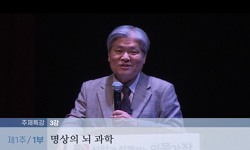[연구목적] 최근 명상에 대한 관심이 기하급수적으로 증가함에도 불구하고, 국내 경영학측면에서 명상이 과연 어떠한 효과를 가지고 올 수 있는가에 대한 연구는 부족한 실정이다. 따라서 ...
http://chineseinput.net/에서 pinyin(병음)방식으로 중국어를 변환할 수 있습니다.
변환된 중국어를 복사하여 사용하시면 됩니다.
- 中文 을 입력하시려면 zhongwen을 입력하시고 space를누르시면됩니다.
- 北京 을 입력하시려면 beijing을 입력하시고 space를 누르시면 됩니다.

명상이 경영교육의 효과성에 미치는 영향에 대한 사례연구 = The Effects of Meditation on the Effectiveness of Business Education: A Case Study
한글로보기https://www.riss.kr/link?id=A105906518
- 저자
- 발행기관
- 학술지명
- 권호사항
-
발행연도
2018
-
작성언어
Korean
-
주제어
Business Education ; Learning Attitude ; Meditation ; Mindfulness ; 명상 ; 마음챙김 ; 경영교육 ; 학습태도
-
등재정보
KCI등재
-
자료형태
학술저널
- 발행기관 URL
-
수록면
43-70(28쪽)
-
KCI 피인용횟수
0
- DOI식별코드
- 제공처
-
0
상세조회 -
0
다운로드
부가정보
국문 초록 (Abstract)
[연구방법] 사례연구를 위해 국내 모 대학 조직행동론 수업에 명상을 도입하였다. 설문방법을 이용하여 질적․양적자료를 수집하였고, 총 59명의 수강생들 중 53명이 자발적으로 설문에 참여하였다.
[연구결과] 본 연구의 결과 학습에 앞선 명상 경험이 학습자로 하여금 학습 집중력의 향상은 물론 긍정적인 학습태도를 갖도록 도와주는 것으로 나타났다. 또한 이러한 수업 내적인 효과에 더해, 학습상황에서 경험한 명상이 수업 외적으로도 개인의 심신안정에 도움이 됨을 보였다. 특히, 명상이 자아성찰의 기회를 제공함과 동시에 학습상황 이외에서 경험하는 다른 문제들을 보다 효과적으로 해결하는 데에도 도움이 되는 것으로 나타났다.
[연구의 시사점] 본 연구의 결과는 학습상황에서, 특히 경영학 교육 상황에서 명상의 긍정적인 효과에 대해 보다 다양하고 깊이 있는 이해의 기반을 제공한다. 또한 대학에서의경영학 교육 측면에서 명상을 어떻게 더욱 효과적으로 활용할 수 있는가에 대한 실무적 시사점을 제공한다.
[연구목적] 최근 명상에 대한 관심이 기하급수적으로 증가함에도 불구하고, 국내 경영학측면에서 명상이 과연 어떠한 효과를 가지고 올 수 있는가에 대한 연구는 부족한 실정이다. 따라서 본 연구는 명상을 국내 경영교육 상황에 접목시킴으로써, 명상을 통해 얻을수 있는 효과를 사례연구를 통해 알아보고자 한다.
[연구방법] 사례연구를 위해 국내 모 대학 조직행동론 수업에 명상을 도입하였다. 설문방법을 이용하여 질적․양적자료를 수집하였고, 총 59명의 수강생들 중 53명이 자발적으로 설문에 참여하였다.
[연구결과] 본 연구의 결과 학습에 앞선 명상 경험이 학습자로 하여금 학습 집중력의 향상은 물론 긍정적인 학습태도를 갖도록 도와주는 것으로 나타났다. 또한 이러한 수업 내적인 효과에 더해, 학습상황에서 경험한 명상이 수업 외적으로도 개인의 심신안정에 도움이 됨을 보였다. 특히, 명상이 자아성찰의 기회를 제공함과 동시에 학습상황 이외에서 경험하는 다른 문제들을 보다 효과적으로 해결하는 데에도 도움이 되는 것으로 나타났다.
[연구의 시사점] 본 연구의 결과는 학습상황에서, 특히 경영학 교육 상황에서 명상의 긍정적인 효과에 대해 보다 다양하고 깊이 있는 이해의 기반을 제공한다. 또한 대학에서의경영학 교육 측면에서 명상을 어떻게 더욱 효과적으로 활용할 수 있는가에 대한 실무적 시사점을 제공한다.
다국어 초록 (Multilingual Abstract)
[Methodology] For case study analysis, the authors implemented meditation in Organization Behavior course in one of the Korean universities. A survey method was used to collect quantitative as well as qualitative data. Out of 59 students who enrolled in the course, 53 students voluntarily participated in the survey.
[Findings] The study results showed that meditation prior to the learning experiences increases learners’ positive learning attitudes including one’s concentration level in learning. Beyond the positive effects in the learning context, meditation also rests one’s body and mind in daily lives. In addition, it provides learners with opportunities for reflection as well as helps them solve problems more effectively outside the learning context.
[Implications] The current study provides new insights that meditation can play in learning contexts, especially in the business education context. Beyond that, it provides the readers with practical implications of how to design and implement meditation programs more effectively in the business education context.
[Purpose] Despite the increasing interests in meditation, our understanding of its effects in Korean business contexts is still in a nascent state. Thus, through case study analysis, this current study aims to examine the effects of meditation in the ...
[Purpose] Despite the increasing interests in meditation, our understanding of its effects in Korean business contexts is still in a nascent state. Thus, through case study analysis, this current study aims to examine the effects of meditation in the Korean business education context.
[Methodology] For case study analysis, the authors implemented meditation in Organization Behavior course in one of the Korean universities. A survey method was used to collect quantitative as well as qualitative data. Out of 59 students who enrolled in the course, 53 students voluntarily participated in the survey.
[Findings] The study results showed that meditation prior to the learning experiences increases learners’ positive learning attitudes including one’s concentration level in learning. Beyond the positive effects in the learning context, meditation also rests one’s body and mind in daily lives. In addition, it provides learners with opportunities for reflection as well as helps them solve problems more effectively outside the learning context.
[Implications] The current study provides new insights that meditation can play in learning contexts, especially in the business education context. Beyond that, it provides the readers with practical implications of how to design and implement meditation programs more effectively in the business education context.
참고문헌 (Reference)
1 백유성, "회복탄력성이 직무스트레스에 미치는 영향: BWF의 매개효과를 중심으로" 한국경영교육학회 32 (32): 1-19, 2017
2 한순미, "학습동기 변인들과 인지전략 및 학업성취간의 관계" 한국교육심리학회 18 (18): 329-350, 2004
3 배영희, "중년 직장남성의 직무스트레스로 인한 불안정성 감소를 위한 명상상담 사례연구" 9 : 40-53, 2013
4 백기복, "조직행동연구" 창민사 2006
5 김정근, "자비명상이 대학생들의 마음챙김, 회복 탄력성 및 스트레스에 미치는 영향" 한국산학기술학회 18 (18): 75-85, 2017
6 김완석, "자비명상과 마음챙김명상의 효과비교: 공통점과 차이점" 한국건강심리학회 19 (19): 509-531, 2014
7 최찬기, "신입사원의 대인관계능력이 직무수행도와 조직적응력에 미치는 영향" 한국경영교육학회 28 (28): 27-54, 2013
8 Yin, R. K, "사례연구방법" 한경사 2016
9 허경철, "사고력신장을 위한 프로그램 개발 연구(Ⅴ)" 한국교육개발원 1992
10 홍성훈, "명상음악 프로그램을 적용한 교양교과 수업활동이 대학생들의 주의집중력과 학습태도에 미치는 효과" 교육과학연구소 41 (41): 27-44, 2010
1 백유성, "회복탄력성이 직무스트레스에 미치는 영향: BWF의 매개효과를 중심으로" 한국경영교육학회 32 (32): 1-19, 2017
2 한순미, "학습동기 변인들과 인지전략 및 학업성취간의 관계" 한국교육심리학회 18 (18): 329-350, 2004
3 배영희, "중년 직장남성의 직무스트레스로 인한 불안정성 감소를 위한 명상상담 사례연구" 9 : 40-53, 2013
4 백기복, "조직행동연구" 창민사 2006
5 김정근, "자비명상이 대학생들의 마음챙김, 회복 탄력성 및 스트레스에 미치는 영향" 한국산학기술학회 18 (18): 75-85, 2017
6 김완석, "자비명상과 마음챙김명상의 효과비교: 공통점과 차이점" 한국건강심리학회 19 (19): 509-531, 2014
7 최찬기, "신입사원의 대인관계능력이 직무수행도와 조직적응력에 미치는 영향" 한국경영교육학회 28 (28): 27-54, 2013
8 Yin, R. K, "사례연구방법" 한경사 2016
9 허경철, "사고력신장을 위한 프로그램 개발 연구(Ⅴ)" 한국교육개발원 1992
10 홍성훈, "명상음악 프로그램을 적용한 교양교과 수업활동이 대학생들의 주의집중력과 학습태도에 미치는 효과" 교육과학연구소 41 (41): 27-44, 2010
11 박남수, "마음챙김에 근거한 스트레스 완화 프로그램이 조직구성원의 정신건강에 미치는 효과" 한국조직학회 9 (9): 107-144, 2012
12 지성구, "마음챙김 명상이 조직유효성에 미치는 영향에 관한 예비적 연구" 한국경영교육학회 31 (31): 93-116, 2016
13 이은진, "마음수련 명상이 대학생의 정서상태에 미치는 효과 - 실버와 발테그 그림검사를 중심으로 -" 한국보건사회학회 (43) : 231-267, 2016
14 김은주, "대학생들의 대학 만족여부를 결정하는 대학교육 서비스 품질 분석" 한국경영교육학회 32 (32): 1-24, 2017
15 김광호, "기업에서의 호흡명상 활용 사례 연구" 17 : 12-15, 2017
16 조선비즈, "기업교육, ‘명상’의 바람이 분다"
17 서성무, "긍정적 정서가 심리적 자본 및 마음챙김에 미치는 영향: 심신수련 프로그램의 효과" 한국경영교육학회 27 (27): 127-156, 2012
18 김철호, "국내의 명상교육 관련 학술논문 경향 분석" 한국윤리학회 1 (1): 275-305, 2018
19 박진형, "美 마음챙김 열풍… 벌써 $10억 규모. 현대불교"
20 최진홍, "[사회적가치 반려기업]⑤카카오, ‘같이가치’로 일으킨 큰 변화"
21 Lovelace, K. J., "Work stress and leadership development: The role of leadership, shared leadership, physical fitness and flow in managing demands and increasing job control" 17 (17): 374-387, 2007
22 Davis, D. M., "What are the benefits of mindfulness? A practice review of psychotherapy-related research" 48 (48): 198-, 2011
23 Baer, R. A., "Using self-report assessment methods to explore facets of mindfulness" 13 (13): 27-45, 2006
24 Shapiro, S. L, "Toward the integration of meditation into higher education: A review of research" The Center for Contemplative Mind in Society
25 Beckman, H. B., "The impact of a program in mindful communication on primary care physicians" 87 (87): 815-819, 2012
26 Shapiro, S. L., "The effects of mindfulness-based stress reduction on medical and pre-medical students" 21 (21): 581-599, 1998
27 Hwang, W. J., "The effects of four days of intensive mindfulness meditation training(Templestay program) on resilience to stress: a randomized controlled trial" 23 (23): 497-504, 2018
28 Hall, P. D., "The effect of meditation on the academic performance of African American college students" 29 (29): 408-415, 1999
29 Goleman, D., "The Meditation Mind" Tarcher 1988
30 Goleman, D., "The Buddha on meditation and states of consciousness, Part I: The teaching; Part Ⅱ: A typology of meditation techniques" 4 (4): 1-44, 1972
31 Carrington, P., "The Book of Meditation" Element Books 1998
32 Knowles, M., "The Adult Learner" Gulf Publishing 1990
33 Yoder, R., "Teaching mindfulness in the college classroom" 25 (25): 1-5, 2011
34 Segrin, C., "Social skills, stressful life events, and the development of psychosocial problems" 18 (18): 14-34, 1999
35 Leary, M. R., "Self-compassion and reactions to unpleasant self-relevant events: The implications of treating oneself kindly" 92 (92): 887-904, 2007
36 Shapiro, S. L., "Self-care for health care professionals: Effects of MBSR on mental well being of counseling psychology students" 1 (1): 105-115, 2007
37 Chang, J., "Relaxation procedures with children: A review" 2 : 163-176, 1989
38 Luthans, F., "Positive psychological capital:Measurement and relationship with performance and satisfaction" 60 (60): 541-572, 2007
39 Robbins, S. P., "Organizational Behavior" Pearson 2017
40 Fiedler, E E., "New Approaches to Effective Leadership: Cognitive Resources and Organizational Performance" Wiley 1987
41 Creswell, J. D., "Neural correlates of mindfulness and affect regulation" 69 (69): 560-565, 2007
42 Wanberg, C., "Navigating the black hole:Explicating layers of job search context and adaptational reponses" 65 (65): 887-926, 2012
43 Carson, J., "Mindfulness-based relationship enhancement" 35 (35): 471-494, 2004
44 Maynard, B., "Mindfulness-based interventions for improving cognition, academic achievement, behavior, and socioemotional functioning of primary and secondary school students" 5 : 1-147, 2017
45 Foley, E., "Mindfulness-based cognitive therapy for individuals whose lives have been affected by cancer: A randomized controlled trial" 78 (78): 72-79, 2010
46 Brown, K. W., "Mindfulness: Theoretical foundations and evidence for its salutary effects" 18 (18): 211-237, 2007
47 Jha, A., "Mindfulness training modifies subsystems of attention" 7 (7): 109-119, 2007
48 Baer, R. A., "Mindfulness training as a clinical intervention: A conceptual and empirical review" 10 (10): 125-143, 2003
49 Roeser, R. W., "Mindfulness training and reductions in teacher stress and burnout: Results from two randomized, waitlist-control field trials" 105 (105): 787-804, 2013
50 Khng, K. H., "Mindfulness in education: The case of Singapore" 4 (4): 52-65, 2018
51 Brown, A. P., "Mindfulness based interventions in counseling" 91 (91): 96-104, 2013
52 Glomb, T. M., "Mindfulness at work" 30 : 115-157, 2011
53 Levesque, C., "Mindfulness as a moderator of the effect of implicit motivational self-concept on day-to-day behavioral motivation" 31 (31): 284-299, 2007
54 Broderick, P. C., "Mindfulness and coping with dysphoric mood: Contrasts with rumination and distraction" 29 (29): 501-510, 2005
55 Slagter, H. A., "Mental training affects distribution of limited brain resources" 5 (5): e138-, 2007
56 Shapiro, D. H., "Meditation: Self-regulation Strategy and Altered State of Consciousness" Aldine 1980
57 Shonin, E., "Meditation Awareness Training (MAT) for work-related wellbeing and job performance: A randomised controlled trial" 12 (12): 806-823, 2014
58 Shapiro, S. L., "Mechanisms of mindfulness" 62 (62): 373-386, 2006
59 Kuechler, W., "Management education and transformational learning: The integration of mindfulness in an MBA course" 42 (42): 8-33, 2018
60 Brown, K. W., "Love the one you’re with: Mindfulness in the expression of relatedness" University of Toronto 2007
61 Craik, F., "Levels of processing: A framework for memory research" 11 (11): 671-684, 1972
62 조현성, "KAIST 명상과학연구소 개소"
63 Adams, R, "How 1 woman single-handedly convinced Intel to let its workers meditate on the job"
64 Baer, D, "Here’s what google teaches employees in its ‘Search Insider Yourself’course"
65 Simons, D., "Gorillas in our midst: sustained inattentional blindness for dynamic events" 28 (28): 1059-1074, 1999
66 Dane, E., "Examining workplace mindfulness and its relations to job performance and turnover intention" 67 (67): 105-128, 2014
67 Terry, D. J., "Effects of work stress on psychological well-being and job satisfaction: The stress-buffering role of social support" 45 (45): 168-175, 1993
68 Good, D. J., "Contemplating mindfulness at work: An integrative review" 42 (42): 114-142, 2016
69 Kabat-Zinn, J., "Comparative and Psychological Study on Meditation" Eburon 161-170, 1996
70 Hart, J., "Clinical applications for meditation: A review and recommendation" 13 (13): 24-29, 2007
71 Towbes, L. C., "Chronic stress in the lives of college students: Scale development and prospective prediction of distress" 25 (25): 199-217, 1996
72 Eisenhardt, K. M., "Building theories form case study research" 14 (14): 532-550, 1989
73 Zeidan, F., "Brain mechanisms supporting the modulation of pain by mindfulness meditation" 31 (31): 5540-5548, 2011
74 Hülsheger, U. R., "Benefits of mindfulness at work: The role of mindfulness in emotion regulation, emotional exhaustion, and job satisfaction" 98 (98): 310-325, 2013
75 Corbin, J., "Basics of Qualitative Research" Sage 2008
76 LaBerge, D., "Attentional Processing: The Brain’s Art of Mindfulness" Harvard University Press 1995
77 Neff, K. D., "An examination of self-compassion in relation to positive psychological functioning and personality traits" 41 (41): 908-916, 2007
78 Weiss, H. M, "Affective events theory: A theoretical discussion of the structure, causes and consequences of affective experiences at work" 18 : 1-74, 1996
79 Chiesa, A., "A systematic review of neurobiological and clinical features of mindfulness meditations" 40 (40): 1239-1252, 2010
80 Beach, M. C., "A multicenter study of physician mindfulness and health care quality" 11 (11): 421-428, 2013
81 Tloczynski, J., "A comparison of the effects of Zen breath meditation or relaxation on college adjustment" 41 (41): 32-43, 1998
82 Duerr, M., "A Powerful Silence: The Role of Meditation and Other Contemplative Practices in American Life and Work" Center for Contemplative Mind in Society 2004
동일학술지(권/호) 다른 논문
-
- 한국경영교육학회
- 송석우
- 2018
- KCI등재
-
- 한국경영교육학회
- 표춘미
- 2018
- KCI등재
-
기업수명주기에 따라 광고선전비가 기업가치에 미치는 영향
- 한국경영교육학회
- 최혁
- 2018
- KCI등재
-
- 한국경영교육학회
- 김정민
- 2018
- KCI등재
분석정보
인용정보 인용지수 설명보기
학술지 이력
| 연월일 | 이력구분 | 이력상세 | 등재구분 |
|---|---|---|---|
| 2026 | 평가예정 | 재인증평가 신청대상 (재인증) | |
| 2020-01-01 | 평가 | 등재학술지 유지 (재인증) |  |
| 2017-01-01 | 평가 | 등재학술지 유지 (계속평가) |  |
| 2013-01-01 | 평가 | 등재학술지 유지 (등재유지) |  |
| 2011-01-24 | 학술지명변경 | 한글명 : 경영교육논총 -> 경영교육연구 |  |
| 2010-01-01 | 평가 | 등재학술지 유지 (등재유지) |  |
| 2007-01-01 | 평가 | 등재학술지 선정 (등재후보2차) |  |
| 2006-01-01 | 평가 | 등재후보 1차 PASS (등재후보1차) |  |
| 2005-01-01 | 평가 | 등재후보 1차 FAIL (등재후보2차) |  |
| 2004-01-01 | 평가 | 등재후보 1차 PASS (등재후보1차) |  |
| 2003-01-01 | 평가 | 등재후보학술지 선정 (신규평가) |  |
학술지 인용정보
| 기준연도 | WOS-KCI 통합IF(2년) | KCIF(2년) | KCIF(3년) |
|---|---|---|---|
| 2016 | 1.39 | 1.39 | 1.34 |
| KCIF(4년) | KCIF(5년) | 중심성지수(3년) | 즉시성지수 |
| 1.3 | 1.28 | 1.351 | 0.59 |




 DBpia
DBpia






